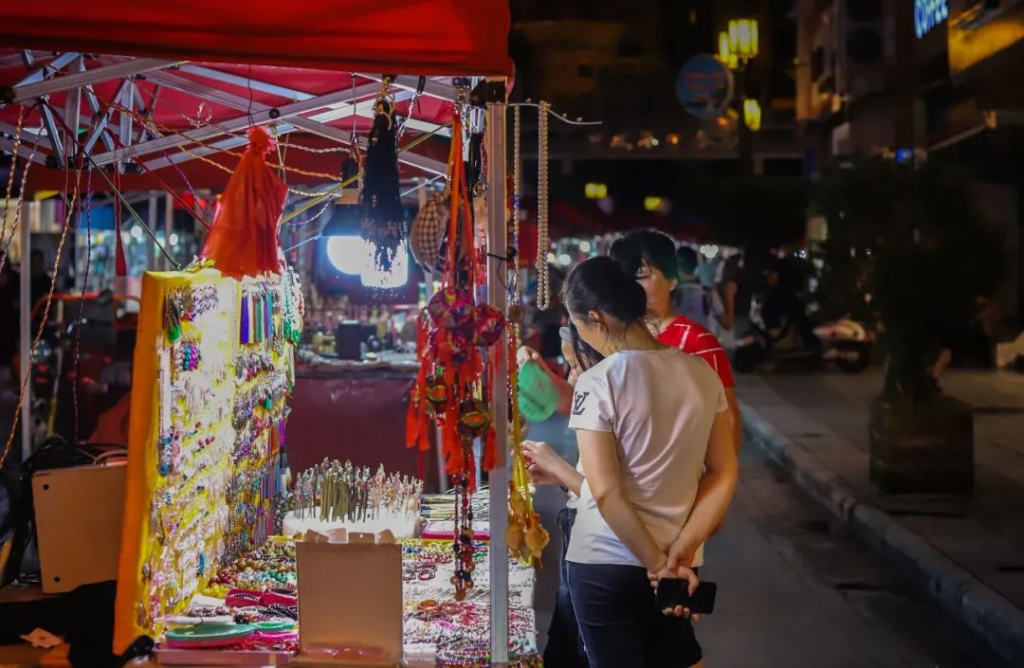
Recently, bǎidìtān (摆地摊, street vending) has become the most searched word online as Chinese government have been trying to boost economy by encouraging self-employed or individual sellers back to streets. In order to release the vitality of street vending economy and make where we live more dynamic, in many cities temporary areas have been set up for mobile booths to provide convenience for the public. Sounds like a good option to start a new business, doesn’t it?

Best Sellings on the Street
What is the most popular thing to sell on the street? Whether you are a buyer or seller, you must know the market before bargaining or running your stall. Here is an online list of top five best sellers for your reference:
1. tèsè xiǎochī (特色小吃, special snack)
2. lùbiān shuǐguǒ tān (路边水果摊, roadside fruit stand)
3. nǎichá yǐnliào (奶茶饮料, milk tea and drinks)
4. értóng wánjù (儿童玩具, children’s toy)
5. xiéwà xiǎo shìpǐn (鞋袜小饰品, shoes, socks and accessories)

Best selling goods are of low cost and large quantity but never bad quality. The more various the goods are displayed, the more attractive they are to the eyes of passersby.
Unlike opening a shop, there is no pressure on the house rent so the investment to the little booth or stall is relatively low. As long as you find your own supply channel, set a suitable price and go to the busiest street, you can just start business immediately. Anyone who is eager to have a try?

The Art of Bargaining
You may accept the price in a shopping mall, but for street products that do not have a tag, it would be fun to tǎo jià huán jià (讨价还价, bargain) and get the thing you want with a satisfying price. Street market is a good place to practice your Chinese as well. If you see something interesting, a routine conversation would be like this:

Nǐ hǎo,qǐng wèn zhègè duōshǎo qián?你好,请问这个多少钱? Hello, how much is this?
Liǎngbǎi kuài。200块。200 yuan.
Kěyǐ piányì yìdiǎn ma?可以便宜一点吗?
Can it be cheaper? (The price looks not that bad but if it can be at a lower price…)
Zuì duō piányì èrshí kuài,yìbǎibā,zhèshì zuì dī jià le。最多便宜20块,180,这是最低价了。I can give you 20 yuan off at most, 180 is the lowest price.

En…yì bǎi kuài mài bú mài?
嗯…100块卖不卖?Umm…How about 100 yuan? (No matter how much it is, the golden rule is to ask for half price!)
Tài dī le ,wǒ jìnjià dōu bú gòu!
太低了,我进价都不够!
That is too low, even lower than my purchasing price!
Tài guì le, suàn le。
太贵了,算了。
Forget about it, too expensive. (I still want the thing but pretend to leave, will he call me back?)
Hǎoba hǎoba ,dài yíjiàn ,wǒ dōu kuī sǐ le 。
好吧好吧,带一件,我都亏死了。
Come on. Be back. I will sell this only to you at such price. I am losing money today!
Well, looks like a happy ending but is every bargaining that successful? You may find answer in the video.
Fall and Rise of Street Vending
The memory of roadside stalls is like everlasting to us. When we were children, bīngtánghúlú (冰糖葫芦, sugar-coated fruit on a stick), xiǎorénshū(小人书, picture-story book), xiāngguāzǐ (香瓜子, sunflower seeds)…are the stuff we asked parents to buy for us if we encounter those peddlers on the street.

Then, stalls somehow transformed into night market. The emergence of barbecue and night snacks become another street vending culture that opened up the nightlife of a city. People like to sit on the stools with barbecue and beer while enjoying gossip about family, celebrities, news, stock market…etc.

Later, the development of e-commerce saves people’s time from going out for shopping. In the meantime, street stalls brought a lot of disputes so that they were restrained due to damage of city environment and stricter governance of chéngguǎn(城管, urban management officer).

This year because of the pandemic impact, stimulating domestic consumption to call for the recovery of economy acts as a special requirement. We do not know how long street vending is going to last this time but people are happy to see stalls back on the street!
